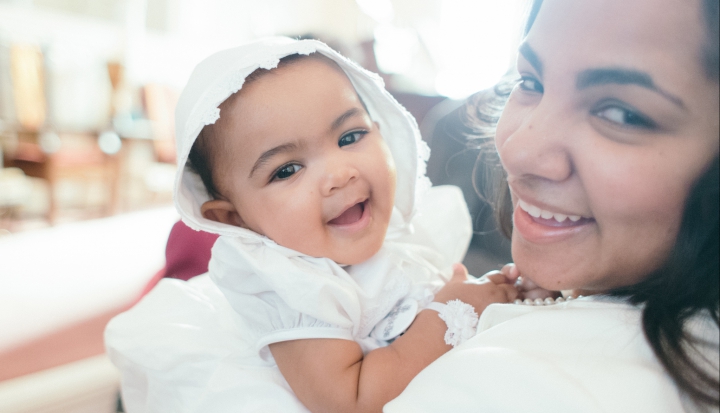When our first son was born, my husband and I, both writers, labored over the choice of what to name him. It had to be right. It had to be original. It was, my poet husband declared with much gravity, “naming a life.” The burden of that weighed heavily on us. We scoured bookstores and online lists of baby names. We wanted something our son could live up to, something that was different, but not weird. After months of combing through thousands of names, we finally landed on Atticus Levi, a nod to both Atticus Finch and my husband’s favorite poet, Larry Levis. Because we are Catholic and knew family would ask, we also made sure there was a St. Atticus who we could refer to out of obligation to the Catholic tradition of naming children after a saint. The saint who was our son’s namesake was a monk who transcribed books, which fit nicely into both our writerly and Catholic values.
When we first took our son to meet my husband’s grandmother, a Polish immigrant who spent time in the labor camps before fleeing to America, my mother-in-law encouraged me to lie. “Tell her his name is Casimir,” she said.
“No way!” I told her. “We chose this name.”
“Trust me,” my mother-in-law advised. “It will be easier if you do.”
I should have listened. What followed was an hour-long argument with an Alzheimer’s-afflicted, 90-year-old Polish babcia who refused to understand the strange name we had assigned to her great-grandson.
“At-ti-COOS?” She tried to sound it out in her thick accent. “What name is this? It’s not Polish. Is a saint?
“Yes,” we told her, “a Greek saint.”
“Greek?” She turned to me. “You Greek?”
“No, Grandma Jean. I’m German.” Her eyes widened. My husband and I shared a look.
“You little Hitler!” she declared. I cringed and tried to explain myself.
And then, a minute later, the argument started all over again. “What’s his name?” she’d ask and we’d tell her and she’d argue against its Catholicity until finally, on the fifth round of questioning, I relented and answered that his name was Casimir. “Casimir,” she murmured, “That’s a good Polish saint name.”
We didn’t actually change our son’s name, but after this exchange, we began identifying the Catholic roots of our children’s names more quickly. “His name is Atticus,” I told people. “As in Atticus Finch and also St. Atticus, a monk who transcribed Christian texts in the Middle Ages.” In naming our next child, we reacted similarly in defending our daughter’s name and quickly associating her middle name (Day) to the Servant of God she was named after (Dorothy Day), all in an effort to ensure our Catholic friends and family would not squawk at our decisions.
Our third child was born on Easter of this year and since the name we chose for her is not rooted in a saint’s name, I started to investigate Canon law to find if naming a child after a saint is actually canonical or merely a tradition to which Catholics adhere. As it turns out, there is no such canonical obligation. Canon 855 of the Code of Canon Law directly addresses this in stating, “Parents, sponsors, and the pastor are to take care that a name foreign to Christian sensibility is not given.”
There’s a generously lax nature to this phrasing. After all, what names could be considered “foreign to Christian sensibility”? Since we have steered clear of Beelzebub and Baal, we are probably fine. But how do we defend our choice to the Polish babcie of the world who have a set of expectations cemented by tradition?
Certainly, I could just say we don’t have to. My husband and I are free to make our own choices and we do so as partners in prayer. But because I respect the traditions of those who came before me, I would like to have a response to questions that might arise regarding the lives we have named.
In response, I have this to say. It is a great opportunity to name a life, but the greater opportunity is to raise a child who knows God and understands God’s name and not her own is at the center of her life. As writers, my husband and I believe in the power of words and naming. That is why a month from now, our newest daughter will be baptized in God’s name. Her name is not Mary, Catherine, or Elizabeth, and her name won’t be found in any but the most obscure list of saint names (if you search hard enough, you can always find some derivative precedent). Still, our promise is to recognize that God has called her by name and she is God’s.
If my husband’s late Polish grandmother were still around, I might lie to make it easier. I might tell her our daughter’s name is Maria or Faustina or Jadwiga just to avoid an unnecessary fight with an old woman whose traditions tell her a saint must be honored with each child. If she is looking down on us now, I hope she can see that even without a saint for a namesake, my husband and I will do our best to make sure that our new baby girl is given deep roots for her faith to grow. And while Odette is not currently the name of a popular saint, maybe a hundred years or so from now, it will be.
Molly Jo Rose’s column, In and Of the World, focuses on finding God’s goodness in the darkest places of the world.












